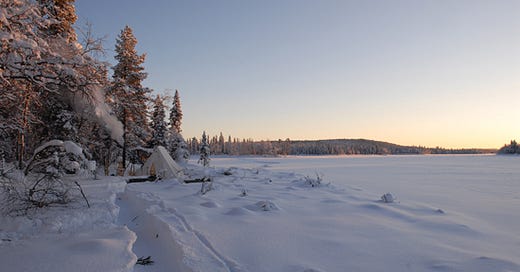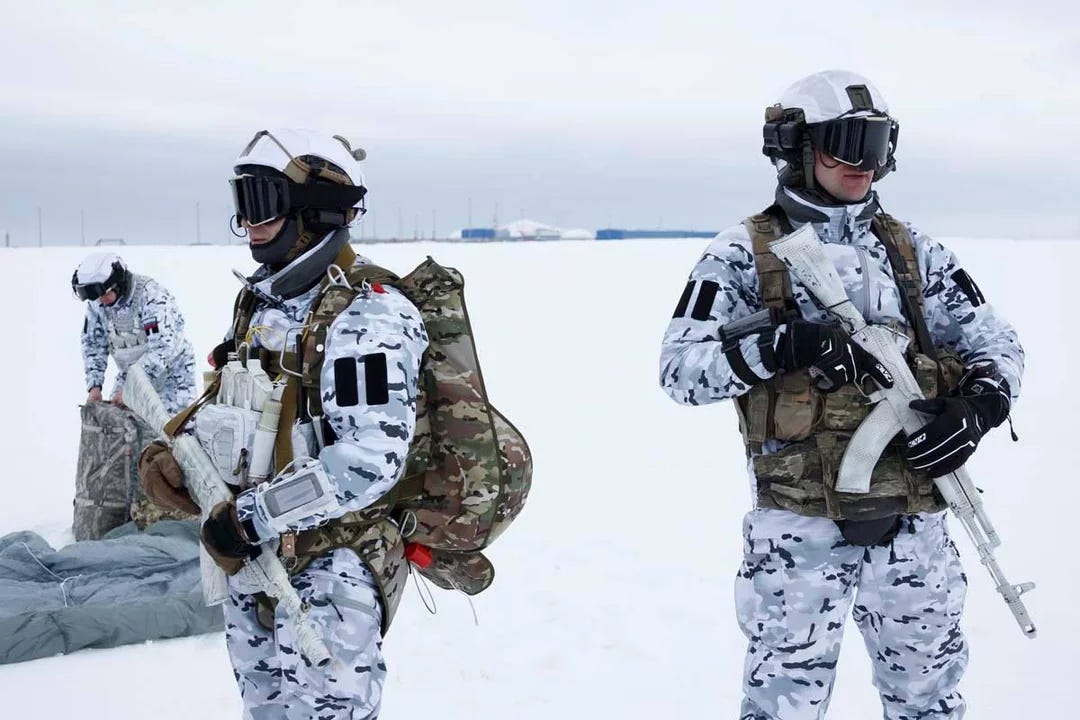Whispers on the Taiga
from "Contagion," the third in the Robert Cook series
It’s particularly interesting to think about the diversity of the players in Siberia when China invades. Siberia has 1.6 million indigenous residents. They know the territory. And they don’t want to become a part of China. This excerpt is deep into China’s invasion of Siberia—and it’s not going well
.
Whispers on the Taiga
Mid-October 2027, Near Ussuriysk, Siberian Front
The taiga exhaled a bitter chill, its pine branches heavy with fresh snow, the air sharp enough to sting Maria’s lungs as she crouched in the mouth of a shallow cave. Her Nanai furs—wolf pelt and reindeer hide—blended with the frost-dusted underbrush, her breath a faint cloud despite the scarf wrapped tight over her nose. At 32, Maria was a hunter turned guerilla, her dark eyes scanning the valley below where a Chinese forward base smoldered, its tents sagging under snow, its Type 99 tanks half-buried and silent. The SARS-CO2 variant, Delta-4, unleashed by Koltsovo, had ravaged the invaders—700,000 dead, a million infected—and Maria felt a grim satisfaction, the virus a silent ally in their fight. Beside her, Ivan, a 19-year-old Yakut herder with a battered AK-74, chewed on a strip of dried reindeer, his face gaunt but alert. Across the cave, Sasha, a 40-year-old Russian militia deserter, cleaned his Dragunov sniper rifle, his scarred hands steady despite the -30°C cold.
Maria’s fingers tightened around her own rifle, a Mosin-Nagant scavenged from a fallen Russian regular, its wood stock worn smooth by her grip. The Chinese sorties—once relentless, their helicopters buzzing like hornets, their special forces stalking the forest—had dwindled. “Fewer drones today,” she whispered, her Nanai accent soft but clipped. “No Mi-17s, no Z-10s. They’re licking their wounds.” The base below was eerily quiet, its perimeter lights flickering, only a few PLA soldiers trudging through knee-deep snow, their biohazard suits cracking in the frost. The virus had done its work, and the winter was finishing it, freezing their trucks, seizing their tanks, and thinning their patrols.
Ivan spat into the snow, his eyes narrowing. “Saw one of their spec ops last week, near the river. Sloppy—tripped a wire trap, lost a leg. They’re not ghosts anymore.” His voice carried a mix of awe and defiance, his herder’s life—tracking reindeer across the taiga—now a skill for ambushes. He’d joined Maria’s band after Chinese shells razed his village, leaving only ash and the memory of his sister’s cough, purple bruises blooming on her skin before she died. The virus spared most Nanai and Yakut, its mutations targeting Han Chinese, and Ivan saw it as justice, though his hands shook when he spoke of home.
Sasha grunted, sighting down his Dragunov’s scope, the lens fogging slightly. “They’re dying faster than we can shoot ‘em. Koltsovo’s plague—it’s a butcher.” A former mechanic from Komsomolsk, Sasha had deserted when his unit was overrun, his captain’s orders to “hold the line” meaningless against Chinese armor. Now, with Maria and Ivan, he struck from shadows, his sniper rounds claiming officers and drone operators. He’d seen a Chinese special forces team two days ago—elite, once, their movements crisp—but they’d faltered, coughing through masks, one collapsing mid-patrol. “They’re scared,” he muttered. “Good. Makes ‘em slow.”
Maria nodded, her mind sharp, calculating. Their band—two dozen Nanai, Yakut, and Russian irregulars—had spent weeks in caves and hideouts, emerging only to harass supply lines or rig traps. The taiga was their shield, its dense pines and frozen rivers a maze the Chinese couldn’t master. “We hit their fuel depot tonight,” she said, her voice low but firm. “Three kilometers east. They’ve got one truck left, maybe two. Burn it, and they’re stranded till the next drone drop.” Her plan was simple but brutal: starve the base, let the virus and cold reap the rest. The Chinese, even their vaunted special forces, were less effective now—exhausted, under-equipped, their biohazard suits failing against Delta-4’s airborne spread
.
Ivan slung his AK-74, his breath quickening. “What about patrols? They still got dogs.” His fear was real—Chinese K9 units had sniffed out two of their fighters last month, leaving only blood in the snow. But Maria’s calm steadied him, her years hunting elk teaching her patience. “No dogs,” she said. “Saw their kennel yesterday—empty. They’re eating ‘em or they’re dead. We move at dusk, stick to the ravine.” Her confidence wasn’t bravado; she’d scouted the base for days, noting fewer sentries, their fires dim, their coughs echoing across the valley.
Sasha packed his rifle, his eyes meeting Maria’s, a silent respect forged through shared raids. “You’re sure about this, Nanai?” he asked, his tone gruff but trusting. Maria’s leadership—born of her village’s defiance, her father’s tales of resisting tsars and Soviets—had kept them alive. She nodded, pulling a crude map from her pack, etched on birch bark. “Here’s the depot,” she pointed, her finger tracing a clearing. “Two guards, maybe three. Ivan, you set the charges. Sasha, cover us from the ridge. I’ll draw their fire if it goes wrong.”
As dusk fell, the taiga darkened, the snow glowing faintly under a sickle moon. The trio slipped from the cave, their movements silent, their furs blending with the forest. The ravine guided them, its icy stream masking their steps. Maria’s heart pounded, not from fear but purpose—her village, burned by Chinese shells, demanded this. The base loomed, its floodlights dim, a single PLA soldier coughing violently by a gate. Ivan planted C4 on the fuel truck, his hands steady despite the cold. Sasha’s scope glinted from the ridge, tracking a second guard. Maria crouched behind a pine, her Mosin-Nagant ready, her breath slow.
The explosion shattered the silence, a fireball erupting, the truck’s fuel igniting in a roar that lit the valley. Shouts rose—Chinese, panicked, their rifles firing wildly into the trees. Maria’s shot cracked, dropping the coughing guard, his biohazard suit no shield against her round. Ivan sprinted back, his AK-74 barking at shadows. Sasha’s Dragunov spoke twice, two more PLA down, their bodies crumpling in the snow. The base descended into chaos, soldiers stumbling, their masks fogged, their coughs drowning out orders.
The trio melted into the taiga, the fire’s glow fading behind them. Back in the cave, Maria exhaled, her rifle propped against the wall. “One less truck,” she said, her voice steady but tired. Ivan grinned, adrenaline fading, his hands still trembling. “They’re falling apart,” he said, almost disbelieving. Sasha nodded, cleaning his scope. “Virus did half our job. Winter’ll do the rest.”
Maria stared into the dark, the taiga’s whispers her only answer. The Chinese were weakening—fewer sorties, faltering special forces, their bases crumbling under Delta-4 and snow. Her band would strike again, and again, until the invaders broke. For her village, for Ivan’s sister, for Sasha’s lost comrades, she’d fight on, the taiga’s jaws closing tighter with every frozen dawn.





